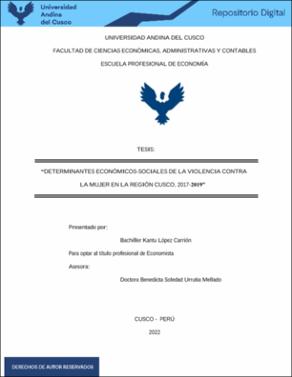| dc.contributor.advisor | Urrutia Mellado, Benedicta Soledad | |
| dc.contributor.author | López Carrión, Kantu | |
| dc.date.accessioned | 2023-05-16T14:50:57Z | |
| dc.date.available | 2023-05-16T14:50:57Z | |
| dc.date.issued | 2022-12-21 | |
| dc.identifier.uri | https://hdl.handle.net/20.500.12557/5431 | |
| dc.description.abstract | La investigación “Determinantes Económicos-Sociales de la Violencia Contra la Mujer en la
Región Cusco, 2017-2019” tiene como objetivo identificar cuáles son los determinantes
Económicos - Sociales de la violencia contra la mujer en la región Cusco, 2017-2019 y analizar la
influencia de las características individuales: empleo, nivel educativo, zona de residencia, lengua
materna y edad de las mujeres en relación con la presencia de violencia contra ellas. La
metodología que se utilizó en la investigación es de enfoque cuantitativo, de diseño correlacional
basado en el Modelo Ecológico de Lori Heise. (1998). Considerando la presencia de violencia
como variable dependiente binaria de pool de datos utilizando la Encuesta Demográfica y de Salud
Familiar con una muestra de 3062 mujeres. Resultando que las variables empleo, nivel educativo,
lengua materna y edad son relevantes en la presencia de violencia contra la mujer. Dentro del
intervalo de confianza del 95 %, se encuentra que; una mujer empleada tiene el 9.37 % más de
probabilidad de ser sometida a actos de violencia. Las mujeres, al incrementar su nivel educativo,
reducen el porcentaje de probabilidad de ser sometidas a actos de violencia física severa del 4.96
% y de ser sometidas a actos de violencia sexual en el 2.34 %, una mujer que habla español como
lengua materna reduce su probabilidad de ser víctima de violencia en el 8.85 % y si la edad de una
mujer incrementa en un año, la probabilidad de sufrir violencia para ella también incrementa en el
1.46 % | es_PE |
| dc.description.abstract | The research "Economic-Social Determinants of violence against women in the Cusco region,
2017-2019" has the objective to identify the Economic – Social determinants of violence against
women in the Cusco Region, 2017-2019 and analyze the influence of individual characteristics:
employment, educational level, area of residence, mother native language and age of women in
relation to the presence of violence against them. The methodology used in the research is
quantitative approach, a correlational design based on Lori Heise's Ecological Model (1998).
Considering the presence of violence as a binary dependent variable of the data pool using the
Demographic and Family Health Survey with a sample of 3,062 women. Resulting in the variables
employment, educational level, mother native language and age are relevant in the presence of
violence against women. Within the 95% confidence interval, it is found that, an employed woman
is 9.37 % more likely to be subjected to acts of violence. Women by increasing their educational
level, reduce the probability percentage of being subjected to acts of severe physical violence by
4.96% and being subjected to acts of sexual violence by 2.34%; a woman who speaks Spanish as
her mother native language reduce her probability of being a victim of violence in 8.5% and if the
age of a woman increases by one year, the probability of suffering violence for her also increases
in 1.46 %. | en_US |
| dc.format | application/pdf | es_PE |
| dc.language.iso | spa | es_PE |
| dc.publisher | Universidad Andina del Cusco | es_PE |
| dc.rights | info:eu-repo/semantics/openAccess | es_PE |
| dc.rights.uri | https://creativecommons.org/licenses/by-nc-nd/4.0/ | es_PE |
| dc.subject | Violencia contra la mujer | es_PE |
| dc.subject | Empleo | es_PE |
| dc.subject | Nivel educativo | es_PE |
| dc.subject | Zona de residencia | es_PE |
| dc.title | Determinantes económicos-sociales de la violencia contra la mujer en la región Cusco, 2017-2019 | es_PE |
| dc.type | info:eu-repo/semantics/bachelorThesis | es_PE |
| thesis.degree.name | Economista | es_PE |
| thesis.degree.grantor | Universidad Andina del Cusco. Facultad de Ciencias Económicas, Administrativas y Contables | es_PE |
| thesis.degree.discipline | Economía | es_PE |
| dc.publisher.country | PE | es_PE |
| dc.subject.ocde | https://purl.org/pe-repo/ocde/ford#5.02.01 | es_PE |
| renati.advisor.dni | 23815007 | |
| renati.advisor.orcid | https://orcid.org/0000-0002-5312-5478 | es_PE |
| renati.author.dni | 70443162 | |
| renati.discipline | 311016 | es_PE |
| renati.juror | Vargas Gibaja, Aurelio | |
| renati.juror | Paullo Tisoc, Rocio | |
| renati.juror | Castro Jiménez, Justo Pastor | |
| renati.juror | Baca Arriola, Kukuly Nemesia | |
| renati.level | https://purl.org/pe-repo/renati/level#tituloProfesional | es_PE |
| renati.type | https://purl.org/pe-repo/renati/type#tesis | es_PE |


